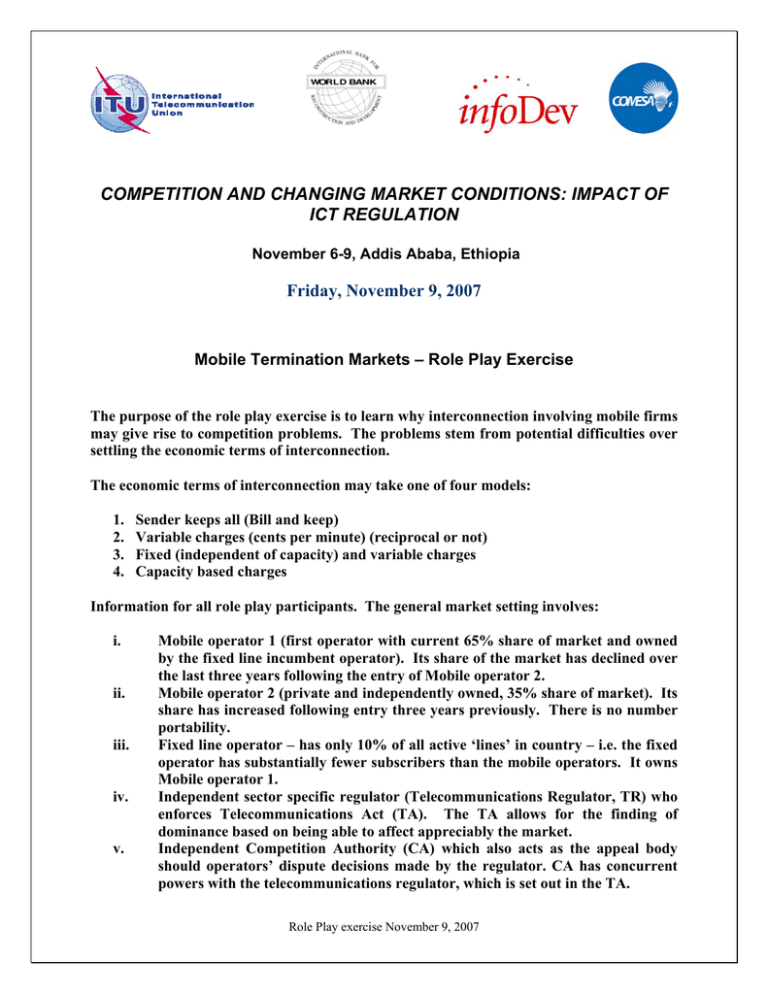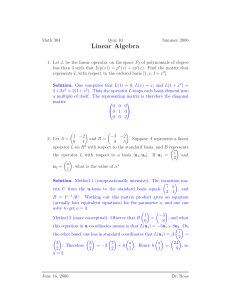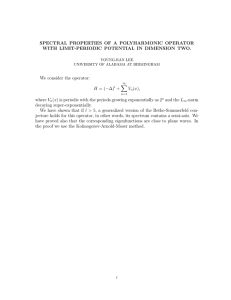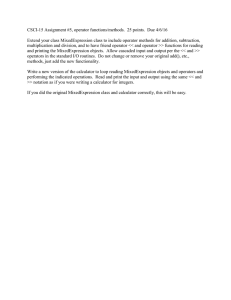COMPETITION AND CHANGING MARKET CONDITIONS: IMPACT OF ICT REGULATION
advertisement

COMPETITION AND CHANGING MARKET CONDITIONS: IMPACT OF ICT REGULATION November 6-9, Addis Ababa, Ethiopia Friday, November 9, 2007 Mobile Termination Markets – Role Play Exercise The purpose of the role play exercise is to learn why interconnection involving mobile firms may give rise to competition problems. The problems stem from potential difficulties over settling the economic terms of interconnection. The economic terms of interconnection may take one of four models: 1. 2. 3. 4. Sender keeps all (Bill and keep) Variable charges (cents per minute) (reciprocal or not) Fixed (independent of capacity) and variable charges Capacity based charges Information for all role play participants. The general market setting involves: i. ii. iii. iv. v. Mobile operator 1 (first operator with current 65% share of market and owned by the fixed line incumbent operator). Its share of the market has declined over the last three years following the entry of Mobile operator 2. Mobile operator 2 (private and independently owned, 35% share of market). Its share has increased following entry three years previously. There is no number portability. Fixed line operator – has only 10% of all active ‘lines’ in country – i.e. the fixed operator has substantially fewer subscribers than the mobile operators. It owns Mobile operator 1. Independent sector specific regulator (Telecommunications Regulator, TR) who enforces Telecommunications Act (TA). The TA allows for the finding of dominance based on being able to affect appreciably the market. Independent Competition Authority (CA) which also acts as the appeal body should operators’ dispute decisions made by the regulator. CA has concurrent powers with the telecommunications regulator, which is set out in the TA. Role Play exercise November 9, 2007 2 The interconnection regime requires parties to negotiate interconnection and that licensees must respond to reasonable requests for interconnection. The mobile operators are seeking to interconnect with each other and are engaged in negotiation. The fixed line operator has concluded an interconnection arrangement with Mobile operator 1. Mobile tele-density is assumed to be 30% and retail prices are based on the calling party pays principle. Role play background - Consumer interest group/politicians complain to the competition authority and regulator that mobile retail tariffs are – on average – too high (the firms are making excessive profits). The consumer interest group claims that returns on capital employed (ROCE) are significantly in excess of the weighted average cost of capital (WACC). - Mobile operator 2 complains that it is not receiving fair interconnection terms and that the Fixed line operator favours its own affiliate. Role play 1 The CA and TR shall meet and organize an outline plan for each organization to address the complaints. The CA and TR will announce the plan to investigate the complaints. They will issue requests to the stakeholders. Role play 2 The CA shall interview the Fixed line operator and Mobile operator 2 separately. Role play 3 The TR shall commence an investigation through a public consultation exercise on the setting of mobile termination rates. Present questions to stakeholders (the operators). Role play exercise November 9, 2007 3 Role play 4 Fixed line operator will respond to the questions set by the CA and TR. Role play 5 Mobile operator 1 will respond to the questions set by the CA and TR. Role play 6 Mobile operator 2 will respond to the questions set by the CA and TR. Role play 7 The CA and TR will respond to the responses made by the operators and present statements. Post role play discussion. . Role play exercise November 9, 2007




